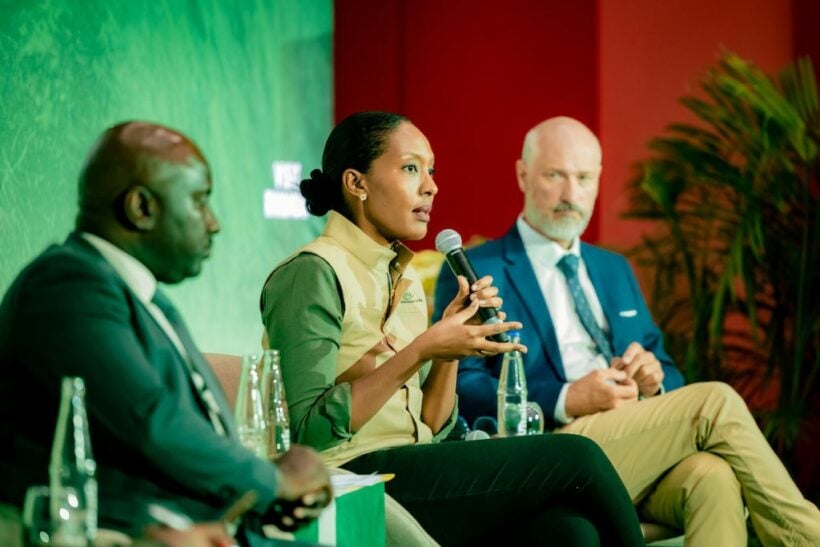
Kigali, Rwanda – The Rwanda Development Board (RDB) today hosted a press conference at the Kigali Convention Centre to announce details of the 20th edition of the Kwita Izina Gorilla Naming Ceremony, scheduled for 18 October 2024 at the foothills of Volcanoes National Park in Kinigi, Musanze District.
Quote from RDB Chief Tourism Officer, Michaella Rugwizangoga:
“It is a great pleasure to welcome you to this press conference as we prepare for one of the most significant events on Rwanda’s conservation and tourism calendar—Kwita Izina. Through this annual event, we celebrate our successful conservation efforts and acknowledge the incredible contributions made by local communities, conservation professionals, and partners from around the globe.”
The Kwita Izina ceremony, which has named 395 baby mountain gorillas since its inception, is part of Rwanda’s broader effort to protect the country’s wildlife and natural ecosystems. These efforts, alongside sustainable ecotourism, have helped Rwanda achieve remarkable growth in its tourism sector, which generated over USD 620 million in revenue from 1.4 million visitors in 2023. Gorilla tourism alone contributes 1% of Rwanda’s GDP and is a key driver of local community development.
Through the Tourism Revenue Sharing Program, 10% of all national park revenues are reinvested in socio-economic projects that benefit communities living near protected areas.
Since 2005, Rwf 12.86 billion has been used to fund 1,108 community projects, including schools, health centres, and dairy farms. These initiatives have empowered communities to become guardians of conservation, protecting both the wildlife and the environment surrounding national parks such as Volcanoes, Akagera, Gishwati-Mukura, and Nyungwe.
“This year’s Kwita Izina marks a significant milestone as we celebrate 20 years of this flagship event,” Ms. Rugwizangoga added.
“We will be naming 22 baby gorillas, and we are excited to welcome past and new Namers from around the world, whose names will be revealed in the coming days.”
In addition to the traditional naming ceremony, pop-up events will be organised in collaboration with the private sector, bringing celebrations to communities across the country. These events aim to make the Kwita Izina festivities accessible to more Rwandans and visitors while further promoting conservation awareness.
Other events include the Business of Conservation Conference (14-16 October), the Kwita Izina Golf Tournament (19 October), and the Kwita Izina Gala Dinner, featuring performances from local and international artists.
Quote from Governor of the Northern Province, Maurice Mugabowagahunde:
“Kwita Izina has brought global recognition to Rwanda’s conservation efforts. In the Northern Province, tourism has fueled growth, benefiting communities and businesses, particularly in Musanze, Nyabihu, and Rubavu. This development includes the rise of luxury hotels and improved road infrastructure, driven by tourism revenues. Additionally, the Tourism Revenue Sharing Program has funded over 659 community projects worth Rwf 5.16 billion since 2005.”
Quote from the Director General of the Rwanda Tourism Chamber, Yves Ngenzi:
“We see Kwita Izina as a vital opportunity to connect Rwanda’s tourism sector with the global market. Each year, this event has grown in significance, creating more avenues for the private sector to engage, whether through pop-up/side events, merchandise sales, or expanded business collaborations. The continued partnership between the private sector and conservation efforts has enhanced Rwanda’s global tourism offering, while also fostering sustainable economic growth and empowering local communities.”
Quote from the Head of Professional Development, African Leadership University School of Wildlife Conservation, Dr. Mike Musgrave:
“The Business of Conservation Conference has been running for four years, and we organise it in partnership with the Government of Rwanda because Kwita Izina and gorilla conservation represent the pinnacle of what can be achieved using Africa’s natural resources. Our vision for conservation shifts the traditional model from one that excludes people to one focused on sustainable development. We aim to transform conservation from a sector reliant on donor funding into a vibrant economic engine that supports livelihoods through wildlife and natural resources. BCC brings together influential leaders and experts from across Africa and the world to discuss policy changes, develop new models, and invigorate conservation as a sector that generates income and prosperity for the continent.”

